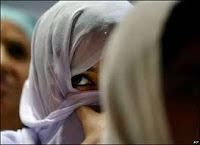An International Women's Movement - Four Principles
The final chapter in Half the Sky discusses social change movements and lays out four principles that a worldwide women's movement to address inequality, education, and health needs should adhere to: Coalitions should bridge political, religious, and social perspectives; Don't undermine your own credibility by overselling and exaggerating findings - being passionate is a good thing unless you let it cloud your ability to thing and problem solve as objectively as possible; The health and education of boys and men should not be ignored - certain initiatives that target men can be just as beneficial for women; Groups and individuals should exchange parochial views and actions for a more global focused outlook. The author adds a fifth principle that should be applied throughout: flexibility. Do you agree with these principles? What would you adjust or change? And, in general, what can you do about the issues discussed in this boo...


